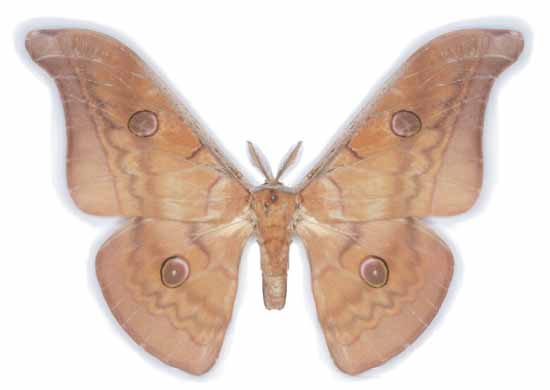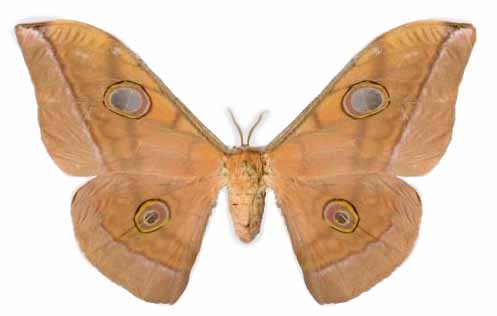Antheraea moultoni
an-THER-ee-uhmmMOUL-ton-eye
Watson, 1927

Antheraea moultoni male
TAXONOMY:Superfamily: Bombycoidea, Latreille, 1802 |
"Eyes for You" |
|
|
Updated as per Nachr. entomol. Ver. Apollo, N.F. 22 (2): 67-74 (2001); courtesy of Stefan Naumann, May 2007 |

TAXONOMY:Superfamily: Bombycoidea, Latreille, 1802 |
"Eyes for You" |
This species varies from orange-yellow through dull red to grey. It is much less variegated than celebensis; the fasciae are clearer and the submarginals are straighter. The bar in the forewing cell is well defined. The nacreous zone of the forewing ocellus in the male is smaller, and the whole ocellus is smaller than that of the female. Some females are almost pure yellow but the original female from Kuching is dull red. The male genitalia are typical of the frithi group.
"Taxonomic notes. Since Allen (1981) and Holloway (1981) discussed this species, a series of both sexes has been taken by T.P.G. Helps in Brunei. This has indicated the range of variations exhibited and has enabled more detailed comparisons to be made with celebensis and with the Brunei and Sarawak material associated with moultoni by these authors. This material was noted to differ from the type of moultoni; the significance of these differences has now become apparent, and the material is described below as a new species, bringing the Bornean total of frithi group species to four. The taxa billitonensis Moore, from Belitung I., north of Sumatra, and surakarta Moore, from Java, are very similar to moultoni and may prove conspecific when more material is available from these localities. In which case the name surakarta (1862) would have priority."

Return to Antheraea Genus
Return to Main Index
The pronunciation of scientific names is
troublesome for many. The "suggestion" at the top of the page is
merely a suggestion. It is based on commonly
accepted English pronunciation of Greek names and/or some
fairly well accepted "rules" for latinized scientific names.
The suggested pronunciations, on this page and on other pages,
are primarily put forward to assist those who hear with internal
ears as they read.
There are many collectors from different countries whose
intonations and accents would be different.
The species name, moultoni, is honourific for
Moulton.